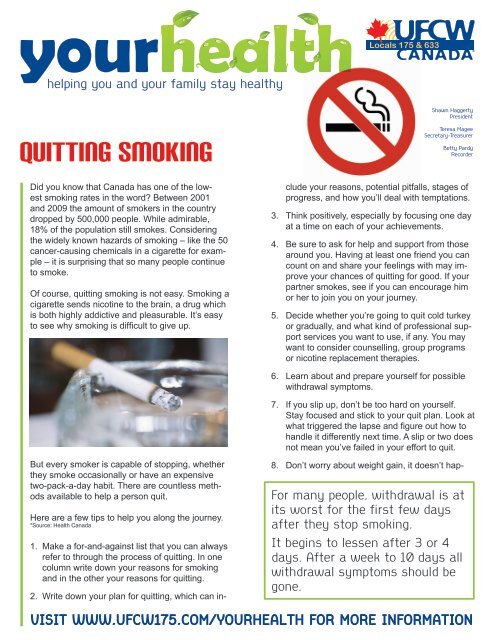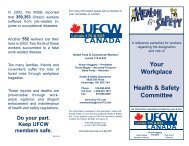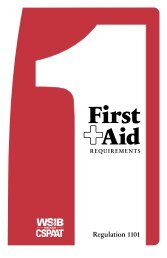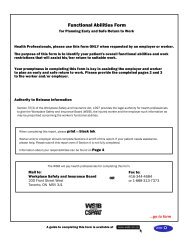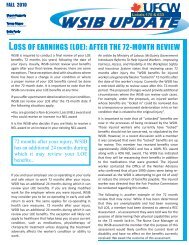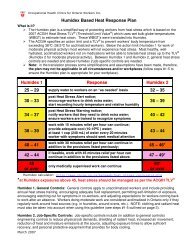QUITTING SMOKING - UFCW 175 & 633
QUITTING SMOKING - UFCW 175 & 633
QUITTING SMOKING - UFCW 175 & 633
- No tags were found...
You also want an ePaper? Increase the reach of your titles
YUMPU automatically turns print PDFs into web optimized ePapers that Google loves.
yourhelping you and your family stay healthy®Shawn HaggertyPresident<strong>QUITTING</strong> <strong>SMOKING</strong>Teresa MageeSecretary-TreasurerBetty PardyRecorderDid you know that Canada has one of the lowestsmoking rates in the word? Between 2001and 2009 the amount of smokers in the countrydropped by 500,000 people. While admirable,18% of the population still smokes. Consideringthe widely known hazards of smoking – like the 50cancer-causing chemicals in a cigarette for example– it is surprising that so many people continueto smoke.Of course, quitting smoking is not easy. Smoking acigarette sends nicotine to the brain, a drug whichis both highly addictive and pleasurable. It’s easyto see why smoking is difficult to give up.2. Write down your plan for quitting, which can includeyour reasons, potential pitfalls, stages ofprogress, and how you’ll deal with temptations.3. Think positively, especially by focusing one dayat a time on each of your achievements.4. Be sure to ask for help and support from thosearound you. Having at least one friend you cancount on and share your feelings with may improveyour chances of quitting for good. If yourpartner smokes, see if you can encourage himor her to join you on your journey.5. Decide whether you’re going to quit cold turkeyor gradually, and what kind of professional supportservices you want to use, if any. You maywant to consider counselling, group programsor nicotine replacement therapies.6. Learn about and prepare yourself for possiblewithdrawal symptoms.7. If you slip up, don’t be too hard on yourself.Stay focused and stick to your quit plan. Look atwhat triggered the lapse and figure out how tohandle it differently next time. A slip or two doesnot mean you’ve failed in your effort to quit.But every smoker is capable of stopping, whetherthey smoke occasionally or have an expensivetwo-pack-a-day habit. There are countless methodsavailable to help a person quit.Here are a few tips to help you along the journey.*Source: Health Canada1. Make a for-and-against list that you can alwaysrefer to through the process of quitting. In onecolumn write down your reasons for smokingand in the other your reasons for quitting.8. Don’t worry about weight gain, it doesn’t hap-For many people, withdrawal is atits worst for the first few daysafter they stop smoking.It begins to lessen after 3 or 4days. After a week to 10 days allwithdrawal symptoms should begone.VISIT WWW.<strong>UFCW</strong><strong>175</strong>.COM/YOURHEALTH FOR MORE INFORMATION
How TO QUIT <strong>SMOKING</strong>pen to everyone and is often insignificant whenit does. Control it by sticking to the same dietyou usually eat, choosing low-calorie snacks,and increasing exercise and physical activity.9. If you experience cravings, try the four Ds: Delay,Distract, Deep Breathing and Drink Water.10. If you believe you’re someone who smokes todeal with stress, look into new ways of coping;there are many.Have you ever heard anyone talk about the stagesof grief? There are stages to quitting smoking aswell. Smokers generally go through five successivestages in the process of quitting, each involvingdifferent issues and challenges. Recognizing thedifficulty you may face while quitting smoking maymake it easier for you to face these tests.1. Pre-contemplation (not thinking about quitting)People who are at this stage are not reallythinking about quitting, and if challenged, willprobably defend their smoking behaviour. Theymay be discouraged about previous attemptsto quit or believe they’re too addicted to everstop smoking. These smokers are not likelyto be receptive to messages about the healthbenefits of quitting. But at some point, the greatmajority of “pre-contemplators” begin thinkingabout quitting.2. Contemplation (thinking about quitting but notready to quit) During this stage, smokers areconsidering quitting sometime in the near future(probably six months or less). They are moreaware of the personal consequences and considersmoking a problem that needs resolution.Consequently, they’re more open to receivinginformation about smoking and identifying thebarriers that prevent them from quitting.3. Preparation (getting ready to quit) In the preparationstage, smokers have made the decisionto quit and are getting ready to stop smoking.They see the “cons” of smoking as outweighingthe “pros” and are taking small steps towardsquitting. For example, in their initial planningphases, they may be smoking fewer cigarettes.They make statements such as “This is serious...something has to change” and may actuallyset a date to quit smoking.4. Action (quitting) In this stage, people are activelytrying to stop smoking, perhaps using shorttermrewards to keep themselves motivatedand often turning to family, friends and othersfor support. They mentally review their commitmentto themselves and firm-up action plans todeal with both personal and external pressuresthat could lead to slips. This stage, generallylasting up to six months, is the period duringwhich smokers need the most help and support.5. Maintenance (remaining a non-smoker) Formersmokers in the maintenance stage havelearned to anticipate and handle temptations tosmoke and are able to use new ways of copingwith stress, boredom and social pressures thathad been part of their “smoker’s identity.” Althoughthey may slip and have a cigarette, theytry to learn from the slip so it doesn’t happenagain. This helps to give them a stronger senseof control and the ability to stay smoke free.*Source: Health CanadaFOR MORE INFORMATIONSource: Health CanadaVisit the Wellnesspage atwww.ufcw<strong>175</strong>.comfor more healthy livinginformation.published December 2011®<strong>UFCW</strong> LOCALS <strong>175</strong> & <strong>633</strong> – 2200 ARGENTIA ROAD – MISSISSAUGA, ON – L5N 2K7TEL 905-821-8329 TOLL FREE 1-800-565-8329 FAX 905-821-7144WWW.<strong>UFCW</strong><strong>175</strong>.COM


